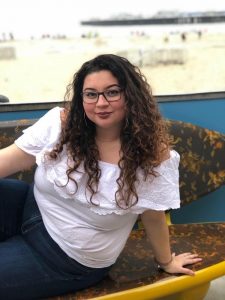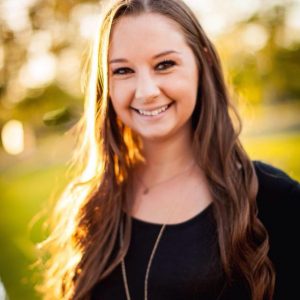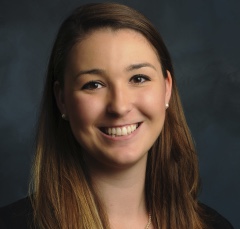Month: March 2018
How do you define Learning and what enables you to make meaning of new knowledge?
Kristina Swift, Peer Tutor Lead

I think learning is a process that you are always continuing to take part in. There is always something new to learn, so it is an experience that never has an end. Most of the time we associate learning with going to class or reading a textbook, but I think learning requires such a formal environment. A lot of my learning comes from my peers either from studying together or even at work.
As a math major, a significant amount of the new material presented in upper level courses requires a strong knowledge of the foundations of math. Thus, a lot of the time making meaning of new knowledge takes the form of connecting what I am learning know, to what I was taught in my first semester as a math major. This allows me to both have a better understanding of the foundational concepts and also see their importance and connections to higher level topics. Additionally, I’ve found that studying with my classmates and talking through the concepts really helps me to understand the new material, as you get a lot of different perspectives and takes on the information, allowing you to look at it from multiple angles. Everyone also has their own way of explaining things, so hearing how others connect the information to previous content helps me to make more connections that I may have not otherwise thought of.
How do you define Learning and what enables you to make meaning of new knowledge?
Haley Rietman, Learning Center Program Assistant
Haley grew up in San Diego, CA. She also attended college in Southern California at Chapman University where she received her bachelor’s degree in Psychology. During her time at Chapman, she worked in their events department and as a tutor, which allowed her to realize the passion she has for working in higher education. Haley hopes that through her work in the Learning Center, she will be able to encourage students to achieve their academic goals which will in turn benefit their overall success. Haley’s passions include traveling, exercising and reading and when she has spare time she likes to explore San Francisco.
As shown through the lens of previous writers on this topic, there are many ways one can define and interpret learning. In its simplest form, learning is the acquisition of new knowledge. Knowledge and learning go hand in hand. What is one without the other? Do we learn new knowledge, or does our knowledge allow us to learn? I believe it’s both.
The main concept that allows me to make meaning of new knowledge is keeping the mindset that there is always something more to learn. We should never allow ourselves to believe that we have learned everything there is to know. By staying in the mindset that I can always learn something new, I am constantly seeking out new information, or discovering how to use the knowledge I already have in a different way – in other words, I am learning. If one believes that they already know everything there is to know, they have closed off their minds to learning something new. Yes, many times learning is unconscious, however, if we strive to be conscious of our learning and seek out learning opportunities, we will be more successful in gaining new knowledge.
I encourage everyone to strive to be constantly learning. Deeper learning is not passive- take the initiative to learn by seeking out wisdom from others, dive into resources such as books, training courses, podcasts, the internet, etc. Set goals for oneself and keep track of the new knowledge you are learning- it might come as a surprise to you as to how much new knowledge you might gain when you are actually seeking it. Lastly, be sure to enjoy the process of learning. Too many times, the joy of learning is overtaken by the stress of preparing for a test or writing a paper but if we can appreciate the process of learning, it becomes a sort of classical conditioning where we are encouraged to keep learning.
Students at the University of San Francisco: I encourage you to utilize the services that the Learning, Writing, and Speaking Centers have to offer. These services are not only offered to students who may be struggling in their courses but also to students who want to learn more and increase their academic skills. The Learning Center strives to assist students who desire higher academic achievement and want to make new meanings of their own knowledge.
How do you define Learning and what enables you to make meaning of new knowledge?
Rachel Brunson, Learning Center Assistant Director
Rachel graduated from USF’s School of Education with a Master of Arts in Organization & Leadership (emphasis in Higher Education & Student Affairs) in 2013, after receiving her Bachelors degree in English from Notre Dame de Namur University in 2011. She is originally from Angels Camp, CA, a small town in the foothills of the Sierra Nevada mountains. Rachel is passionate about enriching student success and impacting student persistence through collaborative learning and peer leadership; she is grateful to work in the Learning & Writing Center, which cultivates individualized learning environments for USF students. Outside of work, Rachel enjoys reading, writing, knitting, hiking, playing the piano, watching basketball, and traveling with family and friends.
When I was in graduate school I took a course called “Sociocultural Foundations of
Organization and Policy,” which introduced me to hermeneutics, the theory and methodology of
interpretation. I wrote my final paper on Theodor “Ted” Seuss Geisel, who you may recognize if
I call him by his pen name, Dr. Seuss. At first glance the topic of this paper may seem trivial, but
studying his life and works with a Hermeneutic lens was as fascinating as it was insightful. All
fancy language aside, what I took away from this course is that learning is an ever-evolving
process and new knowledge is understood through our imaginations and our experiences.
Essentially, we do not learn new things in isolation from other things. As a mentor of mine
defines it, learning is “the manipulation of what you already know to make new
information meaningful.”
Sometimes talent surfaces in the most unexpected candidates. Sometimes those who are
believed in the least turn out to be the biggest surprise. Such is the case of “Dr. Seuss,” the boy
who lacked any ounce of ambition but who became one of the most well-known and imaginative
children’s story authors of all time. In high school Ted sharpened his skill of making things
awkward, misshapen, and bizarre, and his classmates voted him Class Artist and Class Wit.
During his junior year at Dartmouth College, Ted worked for the humor magazine and
discovered the “excitement of marrying words to pictures” (Fensch 2000:39). He also
determined that writing and editing a college newspaper or magazine seemed to be a better
education than attending his college classes. He approached graduation with no career in sight,
no job on the horizon, no plans, and with no real ambition to do anything. He was even voted
“least likely to succeed” (Fensch 2000:41). He then went to Oxford University in England, but
eventually dropped out and moved back to the US with no job, no prospects for a job, and
supposedly no talent for a job, either.
Dr. Seuss’s historical background plays a crucial role in understanding him—it was through his
artwork that he created a world with no rules, the sense of freedom he’d longed for since he was
a young child staring out of his bedroom window. Reading his texts through the prism of his
real-life experiences and attitudes reveals that true understanding is reached through one’s
imaginative abilities. Kearney (1998:149) says, “The symbolizing power of
imagination…transforms given meanings into new ones, [and] enables one to construe the
future as the ‘possible theatre of my liberty,’ as a horizon of hope.” The most obvious connection
with Dr. Seuss and Hermeneutics is the power of imagination.
Life can be seen as a great balancing act, whether that be due to different horizons fusing
together, a sense of identity loss or uncertainty, or other factors. The past and future are
negotiated in terms of the present, and this is all a by-product of imagination. Ironically enough,
one of Dr. Seuss’s most famous and widely gifted books, “Oh, the Places You’ll Go!” is based
on a cynical phrase that he picked up during a time when he was just beginning to explore his
imaginative abilities: right as he was leaving for college.
As you continue your journey, I invite you to reflect on these questions, as I try to do
periodically…
Do you rely on past knowledge and/or experiences as you work to create new understanding?
Do you allow yourself space to learn from “mistakes” or situations that did not go as planned?
Do you imagine a successful future, or focus mainly on the tasks (or the stresses) of the
present?
How can you sustain a “horizon of hope” and what reminders do you need in the ever-evolving
process of learning?
What resources can you use to enable you to make meaning of new knowledge?
If you are a student at the University of San Francisco, do not hesitate to visit The Learning
Center for resources or assistance! We aim to support students in redefining themselves as
learners, enhancing their current skills and talents, developing new skills and strategies, setting
concrete goals and make effective decisions, holding themselves accountable and practicing
self-regulation, challenging themselves to be their best. We sit down 1:1 with students for
Academic Skills Coaching appointments to help you get started and stay on track! Come see
us!
References:
-Kearney, Richard. Poetics of Imagining: Modern to Post-Modern. Fordham University Press, New York, 1998.
-Fensch, Thomas. The Man Who Was Dr. Seuss. New Century Books, Texas, 2000.


